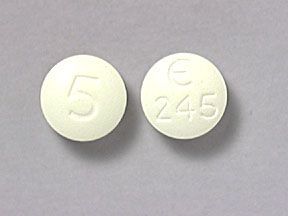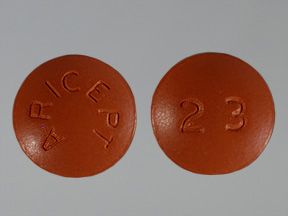If you have dementia, your doctor might suggest Aricept as a treatment option. It’s a prescription drug used to treat dementia related to mild, moderate, or severe Alzheimer’s disease.
Aricept comes as a tablet you swallow and an orally disintegrating tablet (ODT) that dissolves on your tongue. Both forms contain the active ingredient donepezil. (An active ingredient is what makes a drug work.) Aricept belongs to a group of drugs called acetylcholinesterase inhibitors.
This article describes the dosages of Aricept, as well as its strengths and how to take it. To learn more about Aricept, see this in-depth article.
Note: This article covers Aricept’s usual dosages, which are provided by the drugmaker. But when using Aricept, always take the dosage your doctor prescribes.
The chart below highlights the basics of Aricept’s dosage. Be sure to read on for more detail about the drug’s usual dosages.
| Alzheimer’s disease severity | Starting dosage | Maximum dosage |
| mild to moderate | 5 milligrams (mg) once per day | 10 mg once per day |
| moderate to severe | 5 mg once per day | 23 mg once per day |
Note: Your doctor will likely prescribe 5 mg daily for 4 to 6 weeks before increasing your dosage to 10 mg daily. Then they’ll likely have you take 10 mg daily for at least 3 months before increasing your dosage to 23 mg daily.
What are the forms of Aricept?
Aricept comes as a tablet you swallow and an orally disintegrating tablet (ODT) that dissolves on your tongue.
What strengths does Aricept come in?
Aricept comes in three strengths: 5 milligrams (mg), 10 mg, and 23 mg.
What are the usual dosages of Aricept for dementia?
Your doctor will likely start you on a low dosage for dementia and adjust it over time to reach the right amount for you. They’ll ultimately prescribe the smallest dosage of Aricept that provides the desired effect.
The information below describes dosages that are commonly used or recommended. But be sure to take the dosage your doctor prescribes for you. They’ll determine the best dosage to fit your needs.
The starting dosage of Aricept for dementia is 5 mg once per day. The starting dosage is the same for both mild to moderate and moderate to severe Alzheimer’s disease.
The maximum dosage for mild to moderate Alzheimer’s disease is 10 mg once per day. The highest dosage for moderate to severe Alzheimer’s disease is 23 mg once per day.
Is Aricept used long term?
Yes, Aricept is usually used as a long-term treatment. If you and your doctor determine that it’s safe and effective for your condition, you’ll likely take it long term.
Below are answers to some commonly asked questions about Aricept’s dosage.
What is the max dose of Aricept?
The maximum dose of Aricept is 10 mg for mild to moderate Alzheimer’s disease and 23 mg for moderate to severe Alzheimer’s disease.
When is the best time of day to take my Aricept dose?
It’s best to take Aricept right before you go to bed for the night. This will help minimize the effect of some possible side effects, such as a slow heartbeat. A slow heartbeat could cause fainting. It’s still important to be careful when getting out of bed in the morning while taking this drug.
If Aricept side effects are disturbing your sleep, talk with your doctor about the best time for you to take your dose.
The dosage of Aricept you’re prescribed may depend on a few factors. These include:
- the severity of the condition you’re using the drug to treat
- the form of Aricept you’re taking
- other conditions you may have
- other drugs you take
- how your body responds to Aricept
Aricept should be taken once per day. The best time to take it is right before going to bed for the night.
You can take Aricept with or without food.
If you’re taking the orally disintegrating tablet (ODT), let it dissolve on your tongue. Then drink a glass of water.
If you’re taking the tablet, you should swallow it whole. Do not crush, split, or chew it. If you have trouble swallowing tablets, see this article for tips on how to take this form of medication. Or ask your doctor if the ODT version of the drug might be a better option for you.
For information on the expiration, storage, and disposal of Aricept, see this article.
Accessible drug containers and labels
Some pharmacies provide medication labels that:
- have large print or use braille
- feature a code you can scan with a smartphone to change the text to audio
Your doctor or pharmacist may be able to recommend pharmacies that offer these accessibility features if your current pharmacy doesn’t.
If you have trouble opening medication bottles, let your pharmacist know. They may be able to supply Aricept in an easy-open container. They may also have tips to help make it simpler to open the drug’s container.
If you miss a dose of Aricept, skip it and resume taking the drug at your normal time the next day. Do not take two doses at one time to make up for the missed dose.
If you do not take Aricept for a week or longer, talk with your doctor before taking your next dose. They may recommend taking a lower dose before resuming your usual dose.
If you need help remembering to take your dose of Aricept on time, try using a medication reminder. This can include setting an alarm or downloading a reminder app on your phone.
Do not take more Aricept than your doctor prescribes, as this can lead to serious side effects.
Symptoms of overdose
Symptoms caused by an overdose can include:
- nausea
- vomiting
- sweating
- salivating
- slow heartbeat
- low blood pressure
- respiratory depression (slowed breathing)
- convulsions
- death (rare but possible if respiratory muscle weakness occurs)
What to do in case you take too much Aricept
Call your doctor right away if you think you’ve taken too much Aricept. You can also call 800-222-1222 to reach America’s Poison Centers or use its online resource. But if you have severe symptoms, immediately call 911 (or your local emergency number) or go to the nearest emergency room.
The sections above describe the usual dosages provided by the drugmaker. If your doctor recommends Aricept for you, they’ll prescribe the dosage that’s right for you.
Remember, you should not change your dosage of Aricept without your doctor’s recommendation. Only take Aricept exactly as prescribed. Talk with your doctor if you have questions or concerns about your current dosage.
Here are some examples of questions you may want to ask:
- Will a higher dosage work better for me?
- Should I take a different dosage if I’m taking other drugs?
- Will a higher dosage increase my risk of certain side effects?
To get information on different conditions and tips for improving your health, subscribe to any of Healthline’s newsletters. You may also want to check out the online communities at Bezzy. It’s a place where people with certain conditions can find support and connect with others.
Disclaimer: Healthline has made every effort to make certain that all information is factually correct, comprehensive, and up to date. However, this article should not be used as a substitute for the knowledge and expertise of a licensed healthcare professional. You should always consult your doctor or another healthcare professional before taking any medication. The drug information contained herein is subject to change and is not intended to cover all possible uses, directions, precautions, warnings, drug interactions, allergic reactions, or adverse effects. The absence of warnings or other information for a given drug does not indicate that the drug or drug combination is safe, effective, or appropriate for all patients or all specific uses.


